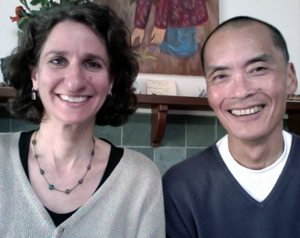Two UC Santa Cruz education researchers will study successful school organizations and teaching approaches that engage urban low-income Latino high school students in academically challenging work thanks to a $580,000 grant from the W.T. Grant Foundation.
Beginning in September, the three-year grant will enable researcher Betty Achinstein and professor of education Rodney Ogawa to investigate what works effectively in classroom interactions between students and teachers, and school-wide interactions among administrators, teachers, and parents at three innovating California high schools. Latino students are the fastest growing student population in California, yet reports reveal how schools are not meeting student needs.
The goal is to improve academic outcomes for Latino students, Ogawa said. "There has been lots of study on what's not working," he said. "It's time we begin documenting successes."
The research project is called “Schools Organized for Latina/o Educational Success” (SOLES). Ogawa and Achinstein work under the auspices of the Center for Educational Research in the Interest of Underserved Students (CERIUS), a research center in the division of Social Sciences at UC Santa Cruz. They will study three urban high schools selected because they have shown successful academic outcomes for Latino students.
Achinstein explained: "We will immerse ourselves in the school culture in order to understand the organizational and instructional factors that make a difference in the lives of Latino youth." The researchers will investigate mathematics and English classes, which Achinstein calls “gatekeeper subjects for college entry.” They will also explore school social structures and resources that promote instruction that engages Latino students in academically challenging work.
Achinstein, previously a researcher for nine years with UCSC's New Teacher Center, is also involved in a related study on the development and retention of teachers of color in schools serving Latino youth. The study will investigate the cultural resources of teachers and the organizational structures that support the teachers. The topic is critical given the call to diversify the teaching workforce, Achinstein said.
In addition to publishing their findings, Achinstein and Ogawa plan to share their research with the subject schools and others. "The goal is to inform educators, researchers, and policy makers, as well as support the efforts of the participating schools and communities in order to address the democratic imperative of educating students equitably," Achinstein said.
Ogawa said he hopes the study will contribute to the redesign and reinvention of American public education. "It is a very different economy now and schools need to be organized differently," Ogawa said, with the objective of closing the achievement gap between underserved students and their peers. "To close that we need to come up with new ways to organize schools."



